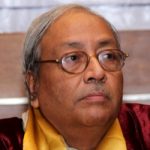There are two choices before all elders: “either to accept the process of ageing gracefully” or “to grumble and be sad about all adverse happenings” as we grow older.
The ageing process is a natural phenomenon, with the clock of life ticking whether one likes it or not. This is true both in terms of “physical” as well as “mental abilities”. As we age, so do our physical organs become feebler and equally weaken our mental faculties. Constant self-initiated exercises, both physical and mental, may to some extent, slow down the process of ageing. Similarly, with the advent of modern medicinal advancement, the process of “quick ageing” may taper down; but the ultimate reality cannot be avoided: that is to become old and move towards the eventual abode of eternal rest.
Being Happy is Crucial:
If the above is the ultimate reality, the best way is to accept the law of destiny and follow the rules of the game cheerfully. Here comes the importance of “happiness” in the process of ageing. There are two choices before all elders: “either to accept the process of ageing gracefully” or “to grumble and be sad about all adverse happenings” as we grow older.
Happiness is always defined as a state of mind. If we accept the true & universal laws of existence and internalize the “purpose of our lives”, there will be a natural adjustment to the process of ageing and happiness will be in our lives as elders.
This is the internal context!!
External Climate to be Equally Conducive:
But things are not as simple as they seem to be. There are many situations where the external climate is hostile and does not allow the elderly to be happy. The often talked about concept of “ageism” i.e., external hostility to elders is constantly rising and is a matter of deep concern. It starts from home. They are often neglected and/or abused by family members; not able to walk on roads take public transport or do things of their own independently because of the inadequacy of elder-friendly infrastructure. Therefore, the elders after an age are either captive in hostile environment of homes or live in a place of seclusion at an old age home, do not move out of fear of “fall” or “other accidents” and finally curse life and everyone around them.
In the above context, the external environment should equally be conducive and adequate to provide a “place for happy ageing” for the elderly. The policy of the UN also calls for fair treatment to all elderly irrespective of their sex, age, religion, economic stands, disability, etc.
Drivers of Happiness Among Elderly:
Some of the well-researched drivers of happiness among the elderly all over the world have been found to be as under:
- Happy families
- Good social network
- Finding purpose in life
- Keep fit and move out
- Positive state of mind
Happy families:
Elders who have good social and bond of love with family members are the happiest persons as elders. They need not necessarily stay together. There should be mental and psychological bonding among the family members. Elders should feel that younger family members are with them in case of need and this feeling itself is a great “happy hormone provider”.
Good social network:
Elders who are in a good social setting are found to be happier compared to those who are not. This social network can be through friends, acquaintances, members of clubs/groups / associations, etc. This social network creates an ambience of “social bonding” and helps elders to remain mentally occupied. This also revives memories of their earlier days of busy life as office goers and thus keeps them satisfied.
Finding purpose in life
Oftentimes, the elders lose their purpose of life. While one is young, one lives for various “short” as well as “long-term” goals like survival, growth in career, happy life, tours/travels outside, buying new cars/houses, etc. Old life does not see any future and hence often loses purpose. Happy elders create purpose or re-discover their “hidden talent” and try to live for something. They may like to try to do some experimentation, learn something new, visit new places, teach poor children, do social servicing, etc. and find a “new purpose of life”. Research has often found that the people who have found a purpose in life (ikigai) always tend to live for the said purpose and are happier.
Keep fit and move out:
There cannot be a better strategy than to keep physically fit and mentally agile to keep busy for the major portion of day. The problem often found with elderly people is that they have much time to idle away, and this gives rise to unnecessary thoughts. The best way to keep the unnecessary thoughts away is to keep busy barring the entertainment and other household work time. “The more you keep busy, the better you will be: rest is the last thing”. That does not, however, mean high-speed strenuous work; there needs to be a balance between work and rest.
Positive state of mind
The last but most important strategy is that one should always have a positive state of mind with the right attitude. A negative attitude does not lead anywhere. Even in the worst circumstances, one should not leave hope and wish for the best. A positive approach of “I can, and I will” always helps to overcome difficult times.
Conclusion
Life is a journey that needs to be traversed. There are bound to be ups and downs as everything follows a normal distribution curve. The axiom, therefore, should be to make “this journey as pleasurable an experience as possible”. And that can only happen if you are happy. Happiness as a strategy is, therefore, the best way of ageing.
Author

Dr A K Sen Gupta is the Co-Founder and Chief Trustee of My Retired Life Foundation (MRLF). This article has been published in Free Press Journal (FPJ) on 6th Sept 2024, where he is a regular contributor. Dr Sen Gupta was the Director of S.P. Jain Institute of Management & Research, Mumbai, and Director & Mentor at SIES College of Management Studies, Navi Mumbai. He was a World Bank Consultant and instrumental in setting up the National Banking College in Ghana, Africa, and a Professor at the National Institute of Bank Management, Pune.




